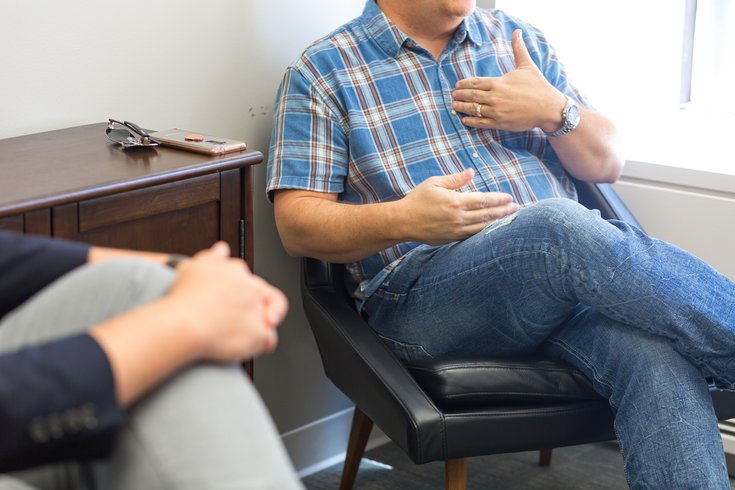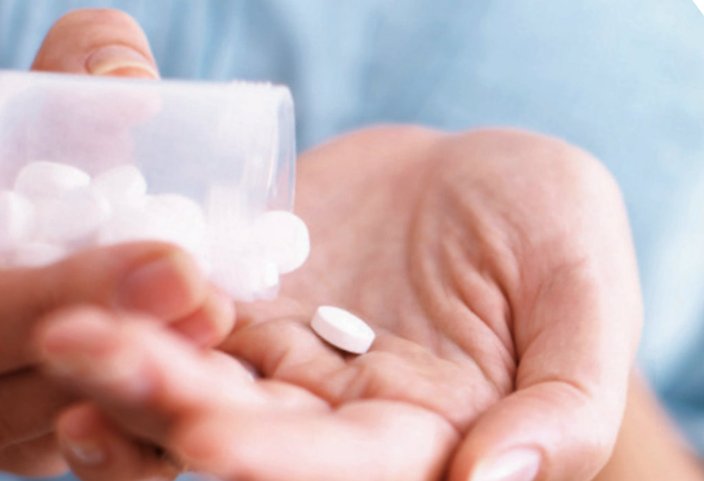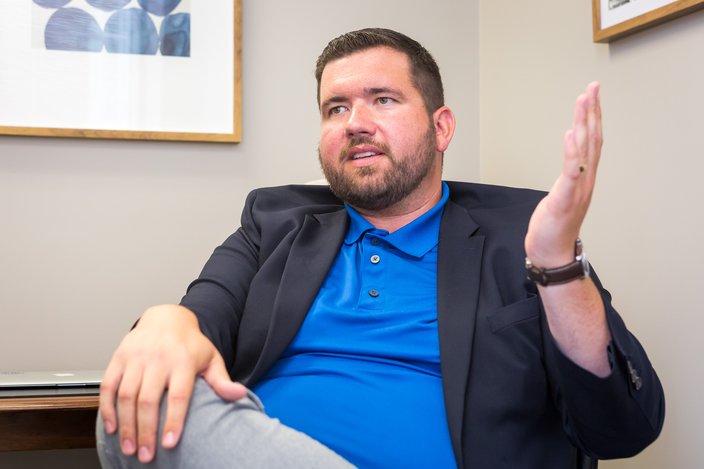
September 05, 2018
 Thom Carroll/PhillyVoice
Thom Carroll/PhillyVoice
Mark, 52, says opioid addiction left him hopeless. Now in recovery, he wants other people battling addiction to know they are not alone.
Mark seemingly had everything the stereotypical American dreams of owning. A house in the suburbs. Two cars in the driveway.
A disabled Navy veteran, he had spent 16 years working as a Veteran Affairs nurse before retiring to pursue a childhood dream – acting.
But he had a debilitating addiction – not unlike millions of other Americans.
"If you drove by my house, you'd have thought I'd be doing pretty well," said Mark, 52, of Montgomery County, who agreed to share his story if PhillyVoice withheld his last name to protect his privacy. "But I was laying up in my room, hoping that I didn't wake up the next morning and figuring out ways that I could kill myself (with) my wife still being able to keep the life insurance."
Mark had been a recovering alcoholic for decades, though he had remained sober for years-long stretches. But a bad car crash several years ago prompted multiple surgeries to relieve sciatic pain and renewed his struggles with addiction.
This time, the substance wasn't alcohol. It was the painkillers he was prescribed by doctors.
"Once you're on this stuff – as you hear out here with the scourge that's going on with opiates – it's a very slippery slope," Mark said. "A lot of people end up getting cut off from their doctor and then ... start using heroin and overdosing. It's a terrible problem in our country."
Mark's story will sound familiar to many of the millions of people who have found themselves impacted by the opioid epidemic. It shows how difficult addiction can be. But it also provides a glimmer of hope that addiction can be overcome.
"When you're in that position, people tend to feel very isolated," Mark said. "If I could get out there with a megahorn or get on the radio or whatever, I'd let people know it's nothing to be embarrassed about. It's nothing to be ashamed of. They're not alone and there's help. There's professional help. There's medical help."
.Mark says he became addicted to prescription painkillers following a bad car crash several years ago.
The first time Mark hit rock bottom, he was standing outside a Dunkin Donuts. He had spent several nights homeless and his stomach was begging for food. But he had no money in his pockets to purchase anything to eat.
Mark was in his 20s, a decade he described as being filled with alcohol abuse. Eventually, he entered a 12-step program and gained sobriety for more than 12 years. He later relapsed before enjoying another seven years of sobriety.
That first bottom, Mark said, was a materialistic one, primarily. His next one – which came as he entered his 50s – was more difficult.
"...It's hard when you don't see hope. When you think your loved ones are better off without you, that's a pretty bad place to be. That's where I was." – Mark from Montgomery County, on hitting rock bottom
This time, prescription opioids fueled an addiction that came with depression, anxiety and suicidal thoughts. Mark spent hours upon hours in bed, inebriated by the drugs and run down by depression.
"Those are two very different types of bottoms," Mark said. "I think the mental one is a lot worse. Because it's hard when you don't see hope. When you think your loved ones are better off without you, that's a pretty bad place to be. That's where I was."
Still, Mark retained memories of overcoming his struggles with alcohol – twice. Despite all the lessons gained from years of Alcoholics Anonymous meetings, he still felt powerless against the drugs.
He was, in a word, hopeless.
But his pride also was getting in the way – a hurdle he realized in hindsight. He didn't want to go back to the meetings and admit to his friends and sponsors that he had a new addiction.
"I knew what it was like to live sober," Mark said. "So, I had that experience to fall back on. But a lot of it is ego. ... Because we all want to look good. But there's a saying: 'You can't save your ass and your face at the same time.'
"I had a choice. I could walk around and look good and lie to everybody while I was dying inside. Or I could tell people the truth and maybe not look so good, but at least be able to get help and to start my life over."
Mark chose the latter. At the urging of a sponsor, he prayed for the willingness to return to the meetings. And he did.
In those meetings, Mark said he regained some hope. He found inspiration in being surrounded by other opioid addicts and having the freedom to be honest about his addiction.
"There's a saying in the groups I attend – it's called a 'gift of desperation,'" Mark said. "I had the gift of desperation where I was just like 'Uncle, uncle, help, help.' I'll do whatever I need to do."
Dr. David Clements, a psychiatrist at Southeastern Executive Health in Center City, takes a holistic approach to addiction treatment.
That help came from Dr. David Clements, a psychiatrist at Southeastern Executive Health in Center City.
Mark said he hit the upswing after the Department of Veteran Affairs connected him with Clements, who didn't see him as an addict, but a person. The doctor quickly gained his trust.
"He's going to go the extra mile for me, so why shouldn't I reciprocate and go the extra mile for him?" Mark said. "It's a dance. If you don't have a good partner, you're not going to be successful."
Clements prescribed Mark a drug called Suboxone, a narcotic commonly used to treat people addicted to opioids. The drug contains an opioid antagonist that blocks the effects of prescription painkillers.
When they first began meeting, their discussions primarily focused on Marks' addiction. But now their conversations revolve around a broader view of his life.
"That's the point of what I do," Clements said. "It's not about taking someone and treating them as an addict. It's about letting them treat themselves as a person. Getting back to why they're living their lives, how they're doing it. What makes them happy about their day-to-day life? It's a very simple treatment plan."
Mark remains on Suboxone, but has not abused prescription painkillers since he began meeting with Clements one year ago. He considers himself sober, though he admits some people might dispute his sobriety given his reliance on the hexagonal orange tablets. Clements supports Mark's distinction, saying abstinence-only treatment doesn't work for everyone.
As Mark sees it, he only has to answer to himself, God and his wife. And he said the Suboxone has helped him regain his life, and landed him starring roles in commercials and small parts in television series.
Recently, Mark shot a commercial and enjoyed an ELO concert. And he continues going to the meetings.
"I'm not responsible for getting my disease or having my disease," Mark said. "But once I find out that I have it, I have a responsibility to take care of it and to be honest with David, or whatever doctor I'm dealing with, to let them know what's really going on.
"Because I can't half-ass it. I can't put a dollar in and expect to get $10 out. I think it's really up to how willing the patient is to be helped."
But Mark insisted that people struggling with addiction need to know there are people – and professionals – ready to help them.
"Listen, you don't have to bare this weight alone," Mark said. "You can go into an office, like David's, and David will know where you've been at. Or you can go into a meeting and people will know where you've been."
 Source/www.cdc.gov
Source/www.cdc.gov Thom Carroll/PhillyVoice
Thom Carroll/PhillyVoice